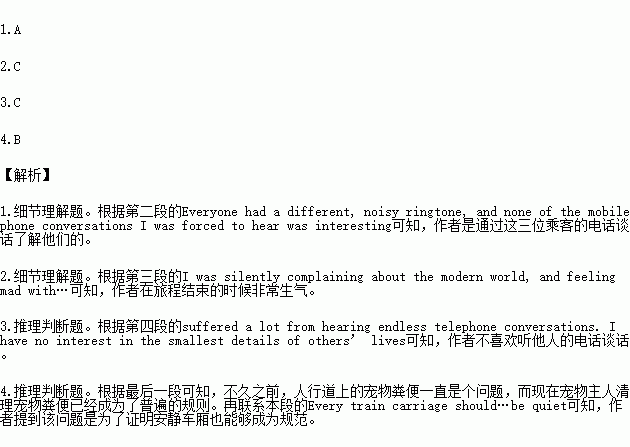题目内容
I had five hours in the company of First Great Western(FGW) last weekend, on a train full of passengers, all the way from Cornwall to London. I got to know some of my fellow passengers rather well. Not through talking to them, you understand.
There was the youth who was explaining to his friend exactly how he enjoyed a party with his friends last night. Opposite him was a young woman who was very excited to be going to Lanzarote for her summer holiday. And then there was the man who I took to be a car mechanic(汽车修理工); so detailed and technical was his conversation about a second-hand Audi. Everyone had a different, noisy ringtone, and none of the mobile phone conversations I was forced to hear was interesting.
By the end of the journey, I was silently complaining about the modern world, and feeling mad with FGW who, at the very moment when our carriage fell silent, would make an announcement about the buffet car (a carriage where food and drinks are sold) either opening or closing.
FGW seems to be campaigning against peace and quietness, having removed quiet carriage spaces where passengers were requested not to use mobiles so that their trains could carry more passengers. How so? I cannot understand why FGW takes no notice of passengers like me, who have suffered a lot from hearing endless telephone conversations. I have no interest in the smallest details of others’ lives. Making people listen to boring mobile phone conversations should be regarded as a rude act.”
Every train carriage should, in theory, be quiet. Why can’t that be the standard? It is possible to change public custom and practice. It was not so long ago that sidewalks were littered with dog waste:now it’s a general rule that dog owners clean it up after their pets. And once we restore peace and quietness to trains, we can then move on and stop people bringing fast food onto them, too.
1.How did the author get to know the three passengers?
A.From their phone conversations.
B.Through introductions.
C.In informal conversations.
D.By using a mobile phone.
2.At the end of the journey, the author ______.
A.became satisfied with FGW’s service
B.felt uneasy about the silence
C.was filled with anger
D.went to the buffet car
3.What can we learn about the author from Paragraph 4?
A.He is in support of the decision of FGW.
B.He believes FGW will have more passengers.
C.He dislikes hearing others’ phone conversations.
D.He thinks it’s rude to listen to others’ conversations.
4.The author mentioned the rule of cleaning up dog mess to show ____.
A.dog mess has become a serious problem
B.quiet carriages can become the standard
C.noise in carriages is as troubling as dog mess
D.changing public custom and practice is difficult
 名校课堂系列答案
名校课堂系列答案
